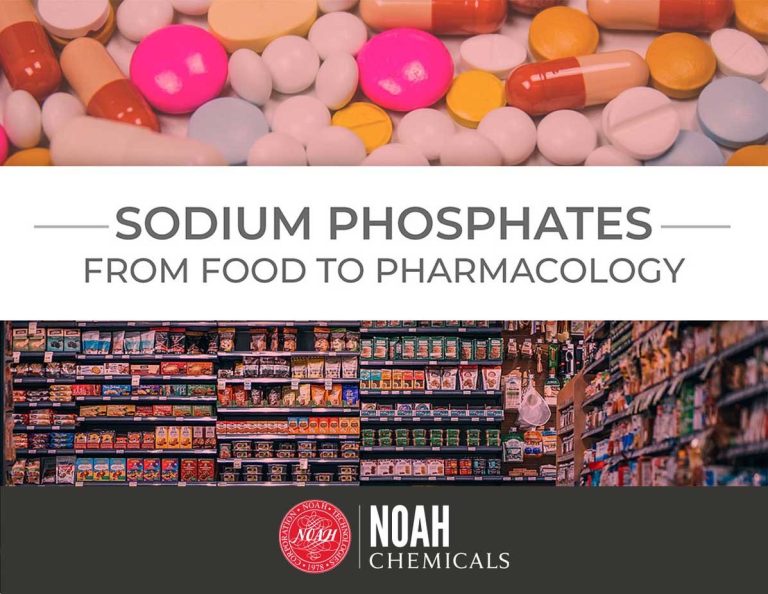
Sodium phosphates are a variety of salts derived from sodium (Na+) and phosphate (PO43−). These salts are available in both anhydrous and hydrated forms. Sodium phosphates have a wide variety of applications, particularly within food processing and pharmaceutical manufacturing.
What is Sodium Phosphate?
Sodium phosphates are known by a variety of chemical names depending on their composition. Monosodium phosphate, sodium dihydrogen phosphate, sodium dihydrogen orthophosphate, sodium phosphate monobasic, and sodium acid phosphate are a few of the most common.
The molecular formulas of sodium phosphate are as follows:
The molecular weight of sodium phosphate is 119.976 g/mol.
Monophosphates…
There are three common families of monophosphates: orthophosphates (PO43−), hydrogen phosphate (HPO42−), and dihydrogenphosphate (H2PO4−). Some of the most sought-after monophosphates include monosodium phosphate (anhydrous), monosodium phosphate (monohydrate), disodium phosphate (anhydrous), and disodium phosphate (heptahydrate).
Diphosphates and Polyphosphates…
Sodium also forms several useful salts with pyrophosphates, triphosphates, and high polymers. Diphosphates are the most common commercially-available version. Other notable polyphosphates include monosodium diphosphate (anhydrous), disodium diphosphate (hexahydrate), and tetrasodium diphosphate (anhydrous).
Sodium phosphate is usually white (but in some cases colorless) as well as odorless. It is offered commercially in myriad forms including CBI, dry powder, liquid, pellets, and large crystals or granules. It decomposes at 200 deg. C. and when heated to decomposition, emits toxic fumes of sodium oxide or phosphoxides. It is freely soluble in water but not in ethanol or in ether. Its pH is between 4.1 and 5.0.
Noah Technologies offers sodium phosphates in a wide variety of forms and purities:
SODIUM PHOSPHATE DIBASIC, ANHYDROUS, 99.5% pure, granular
(Disodium Phosphate; Disodium Hydrogen Phosphate)
Available in research quantities (10 KG, 50 KG)
Available in bulk quantities (>500 KG)
SODIUM PHOSPHATE DIBASIC, ANHYDROUS, ACS Reagent, powder
(Disodium Phosphate; Disodium Hydrogen Phosphate)
Available in research quantities (10 KG, 50 KG)
Available in bulk quantities (>500 KG, >2500 KG, >10000 KG)
SODIUM PHOSPHATE DIBASIC, ANHYDROUS, FCC, granular
(Disodium Phosphate, Disodium Hydrogen Phosphate)
Available in research quantities (2.5 KG, 10 KG, 50 KG)
Available in bulk quantities (>500 KG, >2500 KG, >10000 KG)
SODIUM PHOSPHATE DIBASIC, HEPTAHYDRATE, ACS Reagent, -30 mesh
(Disodium Phosphate, Heptahydrate)
Available in research quantities (10 KG, 50 KG)
Available in bulk quantities (>250 KG, >1000 KG, >5000 KG)
SODIUM PHOSPHATE MONOBASIC, ANHYDROUS, Reagent, -60 mesh
(Monosodium Phosphate, Sodium Dihydrogen Phosphate)
Available in research quantities (5 KG, 25 KG)
Available in bulk quantities (>100 KG, >500 KG, >2500 KG)
SODIUM PHOSPHATE TRIBASIC, ANHYDROUS, Chemically Pure, granular
(Trisodium Phosphate)
Available in research quantities (5 KG, 25 KG)
Available in bulk quantities (>250 KG, >1000 KG, >5000 KG)
SODIUM PHOSPHATE TRIBASIC, DODECAHYDRATE, ACS Reagent, powder
(Trisodium Phosphate, Dodecahydrate)
Available in research quantities (2.5 KG, 10 KG)
Available in bulk quantities (>100 KG, >500 KG, >2500 KG)
SODIUM PHOSPHATE TRIBASIC, DODECAHYDRATE, Chemically Pure, crystal
(Trisodium Phosphate, Dodecahydrate)
Available in research quantities (10 KG)
Available in bulk quantities (>100 KG)
One of the most significant commercial uses for sodium phosphate is as an additive for food. Sodium phosphates are often used as emulsifiers, as stabilizing agents, and even as leavening agents. They can be used to control the pH levels of processed foods as well.
Texturizing
Disodium hydrogen phosphate is frequently used to “texturize” processed foods. This process can lengthen the shelf life of the food itself and give it a more pleasant mouthfeel when eaten. Texturizing changes both the feel and the appearance of a food.
Emulsifying
Almost all sodium phosphates act as emulsifiers. Emulsifiers are used to uniformly disperse two or more ingredients that would otherwise be immiscible; in food production, the most popular use for emulsifiers is to keep oil from separating out of a processing food product. Sodium phosphates, specifically, are commonly used as emulsifiers in processed meats, processed cheeses, and in canned soups.
Neutralizing
Because sodium phosphates are relatively basic, they are often added to foodstuffs to keep them from becoming too acidic. This process lengthens shelf life and also ensures processed foods taste fresh.
Surface-Activating
Sodium phosphates are sometimes used to disrupt the surface tension on the liquid components of processed foods. Common examples of this use include whipped cream products and foamed cheese spreads.
Leavening
For reasons of cost and/or composition, sodium phosphates are frequently used as leavening agents for processed baked goods to help them rise during production. Common uses include as a batter for breaded chicken or fish and for pre-baked cakes.
Sodium phosphate is naturally occurring in many foods. The mineral phosphate is naturally found in milk, nuts, eggs, and poultry. It is an important mineral for bone health and a variety of kidney functions.
Sodium phosphates are considered safe for human consumption by the Food and Drug Administration.
Sodium phosphates are a versatile, widely-used class of salts. With dozens of applications in a plethora of fast-growing industries, they will likely continue to be one of the most sought after chemical compounds in production for years to come.
Noah Technologies is a leading supplier of sodium phosphates for research, manufacturing, and industrial processing purposes. Our longstanding customers appreciate just how deeply our commitment to quality is ingrained in our process.
To order sodium phosphates online, please browse the Noah Technologies catalog to find out what we’re offering right now.
Inorganics
Evaporation Materials
Reagents
Alkoxides
Intermetallics
Pharmaceutical Intermediates
Metals in Various Forms
Metal Salts
Rare Earths
Cosmetic Chemicals
Ceramics
Solutions and Suspensions
1 Noah Park
San Antonio, Texas, USA
Sales: +1 (210) 807-4443
Chemicals Services: (833) 662-NOAH
Office: (210) 691-2000